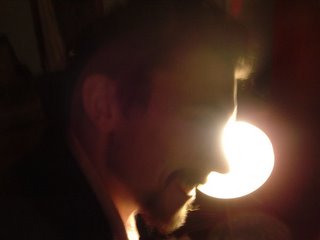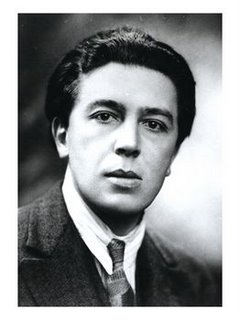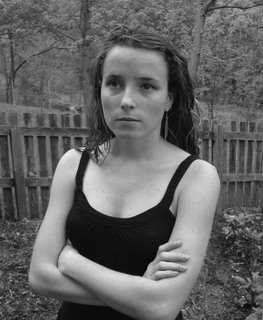I am reading Thomas More's
Care of the Soul right now. In March I was reading Mark Epstein's
Open to Desire. What an interesting inner year it has been. First, Epstein's killer treatise on Buddhism's realistic view of its own detachment tenets, which aren't what I'd thought at all, some rational decision not to feel, but rather an outrageous commitment
to feel deeply. And now More's book about the soul provides a sort of roadmap or shopping list (terrible ways to say it) of what the vitals of our spirits
need to feel. Basically, I'm learning, we need the negative as much as the positive. It is the negative that shapes and feeds our souls as much as the positive smoothes it. This brings up in me endless reconsiderations of suffering, and I recall Mark Mathabane's warning in a speech delivered at Christ School two years ago: be weary of the easy life for it teaches you nothing.
I learned of a terrible tragedy last week. The best friend of someone incredibly close to me shot himself, leaving my friend's name in the suicide note. My friend has been dealing with the tragedy on all levels: taking care of his friend's 5 and 7 year old daughters, all the legal matters, packing up the belongings. He is doing, as we say, all he can. It was this event, this ongoing process, that led me to think about that WCW quote, "People die alone and miserable for lack of what is found" in poetry. The quote has followed me around all my life, popping up, and I'd usually put it back, not wanting to think about it. But I'm ready to face it now: the alone and miserable part has been jarred into comprehension by my friend's friend's suicide. The alone and miserable part is hard to swallow--poetry brings us face to face with our solitude and, quite often, our misery. And in so doing, shows we are not so alone. But it's more than just a linguistic bridge over troubled waters. It serves the part of the life the soul feeds on, that place where loss brings us near death and lets us celebrate life simply by choosing to stay in it.
I read the Agha Shahid Ali poem "Farewell" to feed this. It is the closest thing to a "good cry" on paper. The tumbling rhythm, the refrains, the imagery of loss. This is language at the soul's best, hewing from the silence a lexicon for the tragic. "If only somehow you could have been mine," Shahid calls out, "what would not have been possible in this world?" And it's this. It is the "if only's" and the "somehow's" and the "possibles" that break us down into our respective nothings, and it's there in our nothing that we find the opportunity to affirm breath.
We are supposed to feel deeply in order for our souls to eat, hums More throughout my current paper journey. Suffering leads us to the soul's mouth. Poetry tells us what to put in.
Here is the poem: the linebreaks are different from those in the book. I'll correct them soon. Now, I have to go to work.
Farewell
At a certain point I lost track of you.
They make a desolation and call it peace.
when you left even the stones were buried:
the defenceless would have no weapons.
When the ibex rubs itself against the rocks,
who collects its fallen fleece from the slopes?
O Weaver whose seams perfectly vanished,
who weighs the hairs on the jeweller's balance?
They make a desolation and call it peace.
Who is the guardian tonight of the Gates of Paradise?
My memory is again in the way of your history.
Army convoys all night like desert caravans:
In the smoking oil of dimmed headlights, time dissolved- all
winter- its crushed fennel.
We can't ask them: Are you done with the world?
In the lake the arms of temples and mosques are locked in each other's
reflections.
Have you soaked saffron to pour on them when they are found like this
centuries later in this country
I have stitched to your shadow?
In this country we step out with doors in our arms
Children run out with windows in their arms.
You drag it behind you in lit corridors.
if the switch is pulled you will be torn from everything.
At a certain point I lost track of you.
You needed me. You needed to perfect me.
In your absence you polished me into the Enemy.
Your history gets in the way of my memory.
I am everything you lost. You can't forgive me.
I am everything you lost. Your perfect Enemy.
Your memory gets in the way of my memory:
I am being rowed through Paradise in a river of Hell:
Exquisite ghost, it is night.
The paddle is a heart; it breaks the porcelain waves.
It is still night. The paddle is a lotus.
I am rowed- as it withers-toward the breeze which is soft as
if it had pity on me.
If only somehow you could have been mine, what wouldn't
have happened in the world?
I'm everything you lost. You won't forgive me.
My memory keeps getting in the way of your history.
There is nothing to forgive.You can't forgive me.
I hid my pain even from myself; I revealed my pain only to myself.
There is everything to forgive. You can't forgive me.
If only somehow you could have been mine,
what would not have been possible in the world?
-- Agha Shahid Ali





